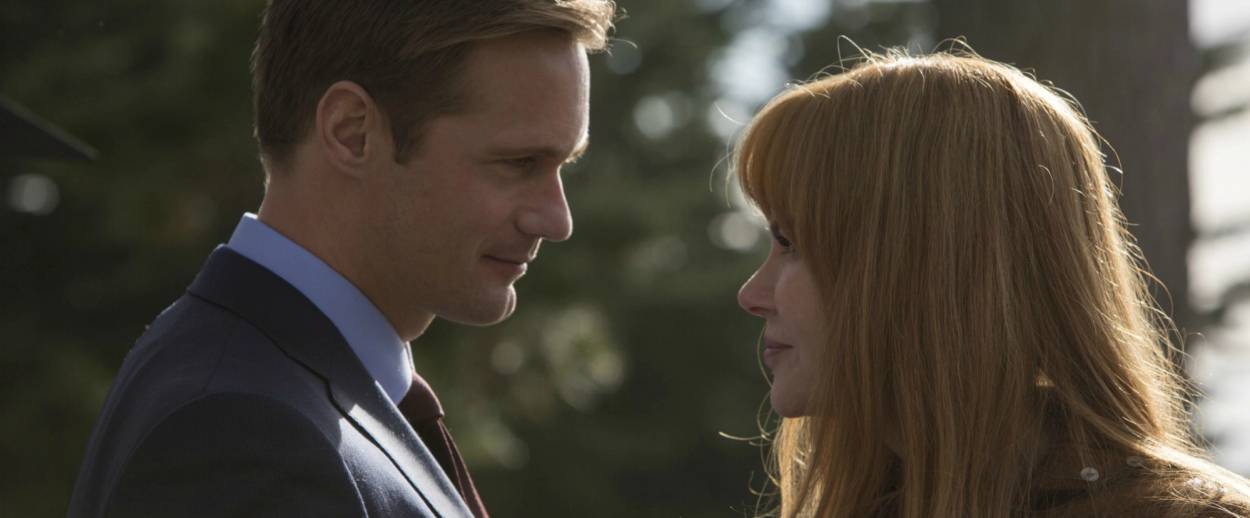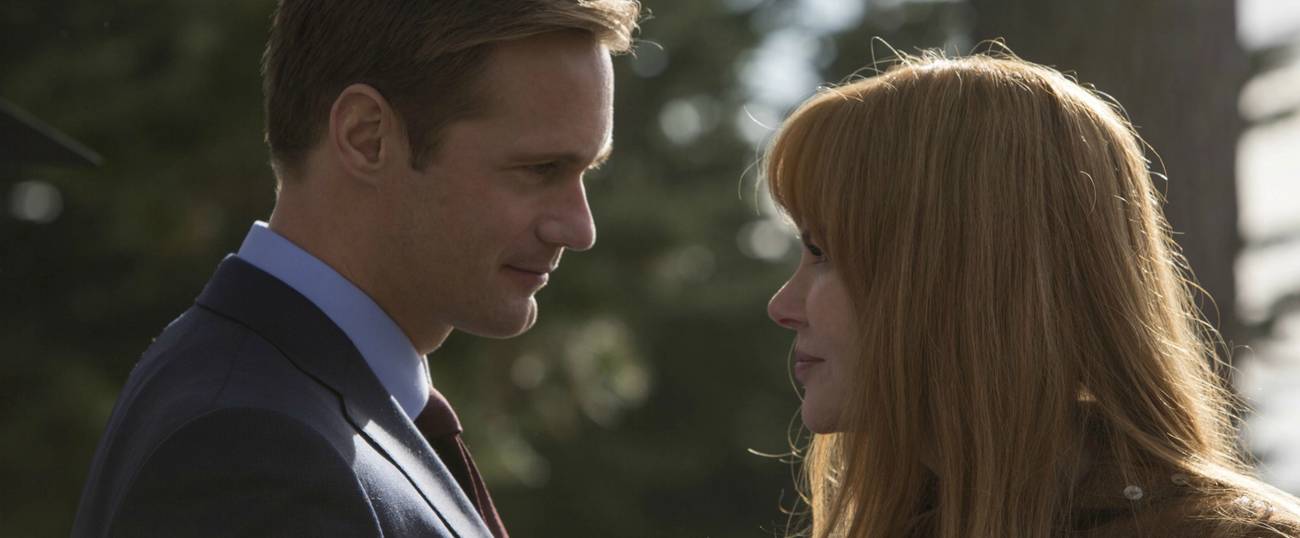What HBO’s ‘Big Little Lies’ Can Teach the Jewish Community About Domestic Abuse
The show’s groundbreaking portrayal of abuse among the upscale punctures a damaging myth




Note: This article contains spoilers for ‘Big Little Lies.’
“He hurts you.”
The therapist’s words pierce the silence. Perfectly coiffed red-haired Celeste Wright, portrayed by Nicole Kidman, immediately gets defensive. “Look. I’m not a victim here. I’m not. I hit him. I throw things at him.”
Big Little Lies, an HBO show adapted from author Liane Moriarty’s bestselling novel of the same name, tells the story of three interconnected mothers of first-graders. Set in picturesque Monterey Bay, CA, the mothers meet at first-grade orientation. The star-studded cast includes Reese Witherspoon as Madeline Mackenzie, a well-intentioned busybody with a kind heart; Nicole Kidman as Celeste Wright, a lawyer turned homemaker; and Shailene Woodley as Jane Chapman, a single mother whose child is accused of bullying another little girl. Laura Dern appears as Renata Klein, the mother of the bullied child, and Alexander Skarsgård portrays Perry Wright, Celeste’s abusive husband.
The show has the potential to be vapid, airy and light, descending into cattiness, but it is not. Seriocomic in nature, it delicately unravels the painful experiences of women navigating second marriages, parenting blended families, struggling with the aftermath of rape, and experiencing domestic violence.
What sets Big Little Lies apart is its depiction of an affluent, well-educated woman within an abusive marriage. It is this which ought to speak directly to members of the Jewish community. A 2013 Pew Research Center report noted that American Jews have “high levels of educational attainment. Most Jews are college graduates (58%) including 28 percent who say they have earned a post-graduate degree.” Compare this to the national standard, where 29 percent of Americans have a college degree with 10 percent boasting post-graduate degrees.
Additionally, “fully one-quarter of Jews (25%) say they have a household income exceeding $150,000, compared with 8% of adults in the public as a whole.”
There is a myth around the topic of domestic violence which suggests it only happens in lower socioeconomic brackets, and it’s one our community too often buys into. Susan Weitzman, PhD, a veteran 20-year psychotherapist on Chicago’s wealthy North Shore, documented this in her book Not to People Like Us: Hidden Abuse in Upscale Marriages. She provides the example of Kathleen, a woman of means who was abused and denied it, saying “I’m too intelligent to be abused.” Kathleen continued, “[P]eople who are abused are low-income and stupid. I’ve seen the shows, and domestic violence is when the guy points a gun in your mouth. He’s got tattoos on his body, he’s in an undershirt, he’s drinking beer, and he’s whamming you around the house. That’s my idea of domestic abuse. As far as I was concerned, what I was going through at that point in my marriage was a communication problem, not abuse.”
Big Little Lies explodes this myth. Celeste Wright is a gorgeous lawyer (although, at her husband’s request, she no longer practices) whose walk-in closet is filled with beautiful jewelry and designer outfits. Her husband is handsome and younger than her, and she is mother to two blonde, mischievous twin boys. She is refined, composed and classy when in public. To the outside observer, her life looks perfect.
But it isn’t. Perry grabs Celeste, shoves her against the wall, has violent sex with her (which she argues is consensual, but which the viewer can see might easily become rape should she refuse) and even overturns a box of toys over her head.
So why, one might ask, doesn’t she leave?
In this week’s episode of Big Little Lies, “Once Bitten,” Celeste reveals some of the reasons she stays with Perry. She states, “We’ve been through so much together. I had a really tough time getting pregnant, four miscarriages, and then the twins were born early… Perry was by my side every step of the way.” She also lauds him as a “great father”; in fact, she cannot imagine a better one. Thinking about leaving him is like “tearing flesh.”
JCADA is the Jewish Coalition Against Domestic Abuse, located in the Greater Washington, D.C. area. The organization offers free clinical support and community education to all residents of the Greater D.C. community regardless of ability, background, faith, gender, or sexual orientation. JCADA’s Assistant Director Cortney Fisher explains, “There are benefits to every relationship. What you’re describing in Celeste’s relationship are the benefits to that relationship. And while it may be an abusive relationship to those of us on the outside, the people in the relationship might look at the whole picture and say, ‘I have an intact family and my kids have a good father. I have the financial freedom to be a room mom for my son’s school.’ Those are benefits to those relationships that I think people from the outside judge a lot. People think: If the abuse was that bad she would leave or he would leave, so it must not be that bad. But the nature of abuse is a cyclical process—the relationship isn’t awful every single day or every single minute.”
Executive Director Elissa Malter Schwartz of JCADA adds, “The outsider is often more judgmental of an affluent victim of domestic abuse because there is a perception that they have resources to leave. It’s really important to understand that the barriers that prevent someone from leaving a $2 million home vs. leaving a home where the person doesn’t know where the next rent check is coming from are different, but the behavior behind the abuse is the same.”
Schwartz has had personal experience working with extremely affluent members of the community. She recalls one anecdote: “We have a client who used to come into the office dripping in diamonds. To look at her, she was really together and quite spruced up. But what people didn’t know was that each day he [her husband] would lay out which diamonds she was to wear and which jewelry she was to wear. So it wasn’t like she could just sell a diamond and leave… If she wanted to get gas in her car he would give her a five dollar bill and request a quarter and a receipt back because he knew how far she could go on that amount of gas. Those were things behind the scenes that we [outside observers] wouldn’t notice especially as someone presents themselves as really looking together and having it all together.”
What about Celeste’s claim that because she hits back, she’s not a victim?
Schwartz immediately clarifies, “If you have to walk on eggshells, make sure the things you say are right, say it in the right tone, the right time, the right ambiance—that is abuse. The retaliation [on Celeste’s part], while not necessarily a safe idea, does not a perpetrator make.”
In fact, Schwartz explains, many police departments will train their officers in identifying primary aggressors in what might otherwise appear to be mutual violence. Among other things, this prevents abusive individuals from turning the situation to their advantage.
Members of the Jewish community sometimes believe that abuse can’t happen within our faith community. Unfortunately, JCADA staff members know for a fact that it does. While Schwartz has not seen Big Little Lies and has reason to be wary of how the media portrays abuse, she asserts, “If the storyline is doing justice to what abuse really is and is working with professionals as technical support behind the scenes then I applaud the intention to highlight an issue that many people don’t see.”
Her takeaway for individuals inspired by the show is to learn how they can best help. She cautions that a layperson should never tell an individual to leave an abusive relationship. This is both because if the victim does not leave, they will not feel comfortable confiding in that friend again and because leaving is the most dangerous time for the victim. The chances of the abuser escalating to violence in an effort to maintain control are high.
“Instead,” she says, “call us. Call the national hotline. Each situation is different—you don’t want to say something wrong.” Connecting the individual to a professional ensures that when they make the choice to leave, they have the right tools and networks in place to enable them to move forward and create the best life possible.
To contact JCADA: https://jcada.org
Confidential helpline: 1-877-88-JCADA
Olivia Friedman teaches Tanakh, Oral Law and Jewish Thought at Ida Crown Jewish Academy. She lives in Chicago with her husband and daughter.